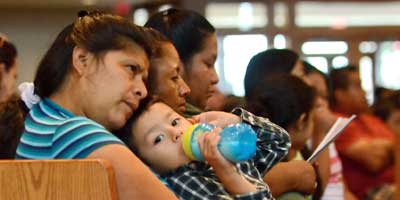
 COLUMBIA—Effective outreach to the growing Hispanic community in the Diocese of Charleston will only be accomplished if every department and parish works together, said Father Teofilo Trujillo, vicar for Hispanic ministry and pastor of St. Mary Magdalene Church in Simpsonville.
COLUMBIA—Effective outreach to the growing Hispanic community in the Diocese of Charleston will only be accomplished if every department and parish works together, said Father Teofilo Trujillo, vicar for Hispanic ministry and pastor of St. Mary Magdalene Church in Simpsonville.
At a workshop for religious education teachers and youth leaders recently, Father Trujillo said statistics show Hispanic ministry is at an important crossroads in the life of the U.S. church. Surveys show Hispanics under 25 are the fastest growing segment of Catholics in the United States. Hispanics make up 35 percent of U.S. Catholics as a whole and have contributed to 71 percent of the nation’s Catholic growth since 1960.
As a result, parishes and dioceses must figure out a way to reach out to people so they can maintain their cultural identities and take on more extensive roles in parish life, Father Trujillo said.
“The church’s response to the Hispanic presence in the United States is an integral part of the life and mission of the church itself,” he said.
“It’s a ministry critically dependent on collaboration and communication,” he continued. “The presence of Hispanic Catholics allows us to answer the church’s call to welcome the stranger, and also to broaden our cultural experience. They are the responsibility of the entire church, not just of some parishes or willing priests.”
{youtube}oYnxqObtzIc{/youtube} Father Trujillo said he hopes to soon hire a director of Hispanic ministry to work with him to oversee programs in the diocese, improve communication and coordinate ministry efforts among different departments. He will appoint a Spanish-speaking priest to act as a local coordinator for the ministry in each deanery.
The Office of Hispanic Youth Ministry falls under the supervision of his office instead of Ethnic Ministries. Father Trujillo wants to develop a pastoral plan that will help make the work more deliberate and focused on its goals.
“We’re not trying to divide the ministry, but organizing a strong office because that way resources can more effectively be shared,” he said.
An important aspect is allowing people to maintain their cultural traditions and, when possible, worship and learn in their own language, Father Trujillo said. Every parish has different resources available, which means that some might be able to offer separate Masses and religious education in Spanish, while others might hold bilingual liturgy and classes.
Everyone should also be encouraged to participate in all parish activities and join councils and committees. This approach has worked well at St. Mary Magdalene, where attendance at Spanish Masses has grown from 250 to more than 1,000 in just a few years.
Hispanic ministry has become so important that it is now a central part of the vocations effort. Diocesan seminarians are required to study Spanish and Hispanic culture, and Father Trujillo serves on the seminary admissions board.
“We need to strengthen the unity of the Body of Christ in an increasingly diverse community,” he said. “Unity is not the same as conformity … the goal is to help people grow in faith in Jesus Christ.”
